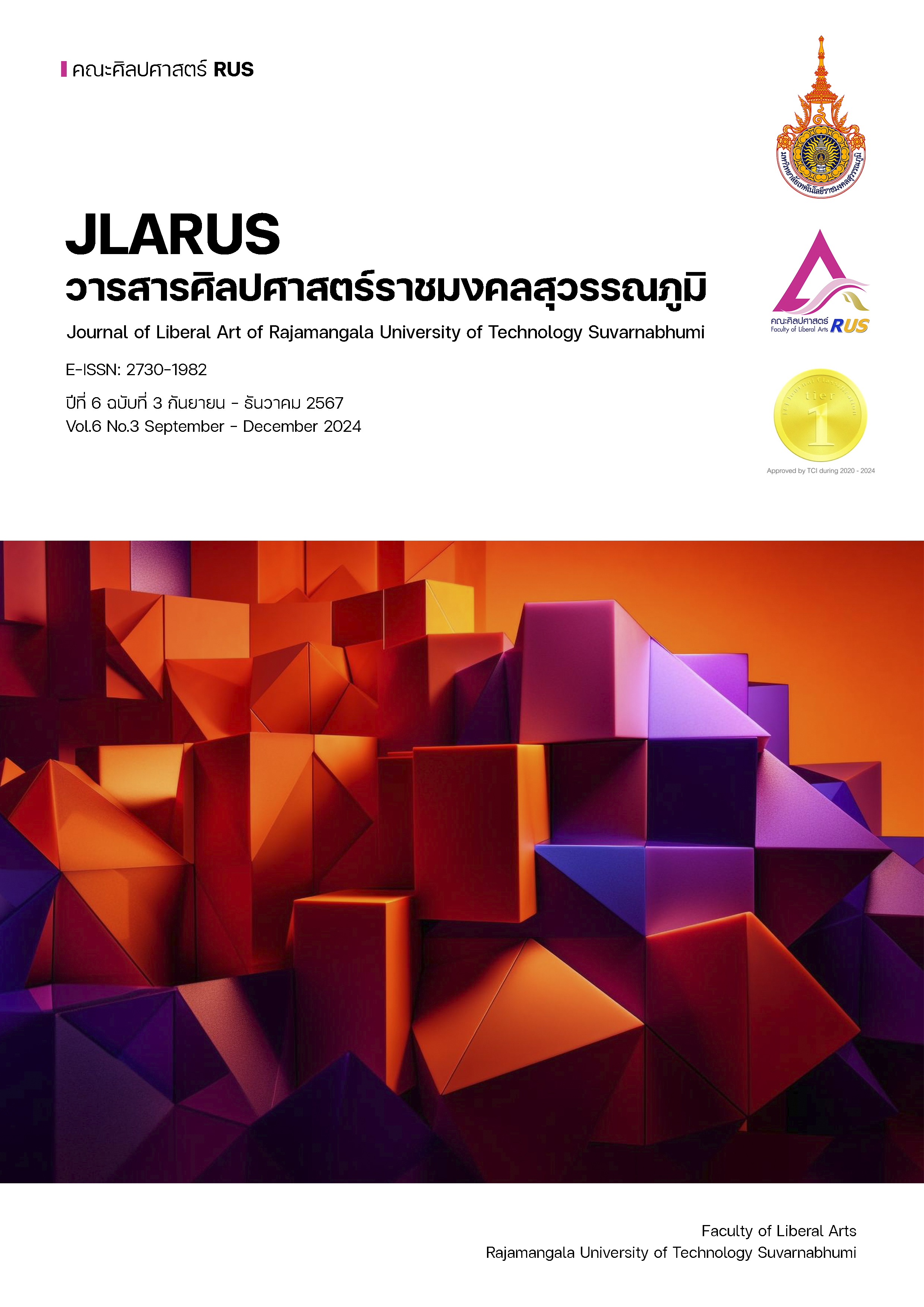THE STUDY OF INHERITANCE AND INNOVATION OF TANG POETRY THROUGH SONG LYRICS IN THE TV PROGRAM EVERLASTING CLASSICS
Main Article Content
Abstract
Chinese poetry has a long history. The Tang Dynasty was a golden period for the development of Chinese poetry. Modern people have innovated the way to inherit Tang poetry, from writing and oral communication increase to media. Everlasting Classics (经典咏流传) is a cultural and musical program of China Central Television. The program has been repeatedly trending and well-received on third-party social media platforms. It has high social acceptance, and people enjoy watching it. The program passes on Tang poetry by adapting it to song lyrics. The aim of this article is to analyse the ways song lyrics inherited and innovated Tang poetry in terms of the text of lyrics content by the theory of “heteroglossia” in the lyrics. The research compared and contrasted the song lyrics and the text of Tang poetry. I conclude that the song lyrics are inherited and innovated from the Tang poetry in the program Everlasting Classics between the first season to the sixth season in four ways: 1) The song lyrics are inherited from the text of Tang poetry. 2) The song lyrics are inherited and innovative through the text of Tang poetry and literature from other ancient dynasties of China. 3) The song lyrics are inherited and innovative through the translation of the text of Tang poetry. 4) The song lyrics are inherited innovative through the juxtaposition of the text of Tang poetry and other parts. This article suggests various ways in which Tang poetry works can be passed on in lyrics, as well as provides a reference for the creation of lyrics adapted from Tang poetry.
Article Details

This work is licensed under a Creative Commons Attribution-NonCommercial-NoDerivatives 4.0 International License.
References
Ardrey, C. (2017). Dialogism and Song: Intertextuality, Heteroglossia and Collaboration in Augusta Holmès’s Setting of Catulle Mendès’s “Chanson”. Australian Journal of French Studies, 54(2-3), 235-252. https://doi.org/10.3828/AJFS.2017.17
Bai, T. T., & Zhang, X. D. (2018). An Analysis of the Aesthetic Culture of Classical Chanting. Journal of Lanzhou University of Arts and Science (Social Sciences), 34(5), 125-128. https://link.oversea.cnki.net/doi/10.13805/j.cnki.2095-7009.2018.05.026
Bakhtin, M. M. (1981). The dialogic imagination: Four essays (M. H. Caryl Emerson, Trans. M. Holquist Ed.). University of Texas Press.
Hamao, F. (1995). The Sources of the Texts in Mahler's" Lied von der Erde". Nineteenth-Century Music, 19(1), 83-95. https://doi.org/10.2307/746721.
Huang, B. R. , & Liao, X. D. (2017). Modern Chinese (6th ed.). Higher Education Press.
Ingham, M. (2013). “The true concord of well-tuned sounds”: musical adaptations of Shakespeare's sonnets. Shakespeare, 9(2), 220-240. https://doi.org/10. 1080/17450918.2012.705879.
Liu, X. C. (2022, April 5). Everlasting Classics is back on the air. “A Chinese Romance” showcases the “beauty of China”. Xinhua Daily Telegraph. http://www.news. cn/mrdx/2022-04/05/c_1310544323.htm.
Lu, Z. L. (2015). 12 Lectures on Lyrics Art. Peking University Press.
Mahler, G. (2017, May 4). Von der Jugend. https://oxfordsong.org/song/von-der-jugend.
National Library of China Digital Library. (2023, May 29). Quan Tangshi Analysis System. http://read.nlc.cn/outRes/outResList?type=%E5%85%A8%E9%83%A8&searchName=%E5%85%A8%E5%94%90%E8%AF%97.
Pan, M. M. , & Yi, Z. W. (2021). Everlasting Classics: Based on the Recreation of Lyrics of Classic Poems. Journal of Pingxiang University, 38(2), 106-111. https://pxjy.chinajournal.net.cn/WKH3/WebPublication/paperDigest.aspx?paperID=753b4661-ee61-4217-90d7-2ebdaf72ce1e#.
Peng, D. Q., Shen, S. Z., Yang, Z. N., Pan, C. L., Xu, S. B., Che, D. J., Wang, S. H., Wang, Y., Zha, S. C., & Yu, M. (1960). The Complete Tang Poems (Quan Tang shi). Zhonghua Book Company.
Sederholm, C. H. (2012). That Vexing Power of Perverseness: Approaching Heavy Metal Adaptations of Poe. In D. R. Perry & C. H. Sederholm (Eds.), Adapting Poe: Re-Imaginings in Popular Culture (pp. 193-205). Palgrave Macmillan US.
Weibo. (2019, March 31). Everlasting Classics. https://s.weibo.com/weibo ?q=%23%E7%BB%8F%E5%85%B8%E5%92%8F%E6%B5%81%E4%BC%A0%23.
Zhu, X. P. (2019). On the Return of Classical Poetry and Modern Lyrics. Journal of the Staff and Worker's University, 31(1), 39-43. https://www.cnki.net/KCMS/detail /detail.aspx?dbcode=CJFD&dbname=CJFDLAST2019&filename=ZDXB201901008&uniplatform=OVERSEA&v=lHOEQpVzhV0AMKaL10h8RkMZWDMfH7F7FzZg_gZE67VwzgPyw-gCGXgoJDw3wVSx.


